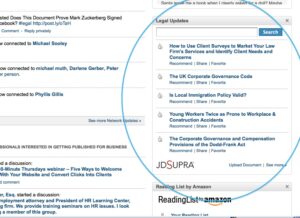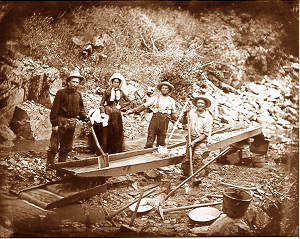As I watch the steady stream of political material flow through my Facebook river, I ask, is it okay for a lawyer or a businessperson with a wide circle of friends on Facebook to post potentially polarizing political material? Though I admit it is a quick way to receive attention—likes or comments—am I the only one who finds some of it inappropriate, unprofessional—offensive?
The VMO wants your opinion. How do you manage your political impulses on Facebook? Is it okay to start or contribute to a thoughtful exchange of political ideas between “friends”? Where do you stand on the issue of social networking and politics?
Meanwhile…
A recent study from Pew Research Center (March, 2012) on social networking sites (SNS) and politics finds that they don’t mix as well as one might think—especially on Facebook. [Download a PDF version of the full Pew Internet & American Life report here.]
Almost four-in-ten users discovered through postings by “friends” that their political beliefs were different than they thought. Some users even blocked, un-friended, or hid those users’ posts from the news feed because they so strongly disagreed, or they were just sick of seeing so many posts all the time.
When it comes to politics, Read Write Web says that “you’re bound to piss someone off.”
Did you know that liberals have the highest visibility on social networking sites and also make up the highest percentage of Internet users? They do, according to the Pew study. However, they also report that among social networking site users, only 25% agree or mostly agree with their friends’ political postings. 73% of users “only sometimes” agree or never agree. If there is disagreement, 66% of SNS users say they usually ignore posts and only 28% of those users respond with comments or posts of their own. A mere five percent say it’s all circumstantial.
Three-quarters of SNS users told Pew researchers that their friends post at least some content related to politics on the sites from time to time. That amounts to roughly 40% of the entire adult population. Still, for some users, politics is an off-limits subject, 22% saying they have decided not to post political comments or links to political material because they were worried it might upset or offend someone. ReadWriteWeb goes as far to say that some conversations on social networks create echo chambers of agreement and mutual outrage rather than real, honest discussion, and that everyone knows that it’s hard to get political anywhere without upsetting at least a few “friends.”
Could being political on social networking sites like Facebook be professional suicide?
What about the digital footprint it leaves? Do we care? I asked a few of my colleagues where they stand on the issue and I’ve included their quotes throughout, with permission.
Heather Morse-Geller, law firm marketing director and blogger:
“I liken my FB to a holiday party I would throw. I have professional acquaintances, professional friends, friends from high school and college, my family, members of my fellowship, etc.
“I’m also a political junkie, having been a lobbyist at one point, early in my career. I like to discuss the issues, and we do on my FB wall, but once people start crossing the line, which is easy to do when you are not face-to-face, I start issuing warning and deleting folks.”
Sometimes I’m surprised at the tone, sometimes it’s the material, and either way coming from working professionals it makes me think that some of my “friends” have lost their frontal lobes to SMAD*.
I mean, who knew there was so much anger or political angst residing in those smiling profile pictures?
Though I find myself wanting to remove some from my news stream, it’s like watching a train wreck: I get sucked into the drama unfolding before my eyes. Seriously, as I watch the almost constant stream of offensive political posts flood my screen, I wonder, really? They know what they’re doing, right? Or maybe its a statement about the people I associate with on Facebook? Time for a trim?
Can you afford to lose business?
Timothy Corcoran, business consultant to law firms and blogger:
“I have political opinions but I would never share them in a business setting or on LinkedIn or Twitter. Even on FB I have generally limited my commentary. I have as much interest in converting others to my views as I have in converting to theirs. And, if it offends prospects or clients, what’s the point?”
Exactly.
Case on point. I had an opportunity yesterday to refer a professional and I had someone in mind. But, unexpectedly I found a Facebook post from that individual just before I made the call. It was a link to an inciting article, filled with negativity, along side his personal, polarizing comments. I immediately crossed this person off the list. I decided this referral would be wrong for my client—on several levels.
Will it make or break their bottom line, probably not. Still, it made me shiver a bit to realize that a single Facebook post—which is certainly within anyone’s right to free speech—impacted a business opportunity so decisively.
Lindsay Griffiths, legal marketing professional and blogger:
“I definitely fall into the camp of keeping my political opinions to myself. While a lot of my clients know which side of the fence I come down on, I can’t just assume that they do, and a number of them are friends of mine on here [Facebook]. I don’t necessarily have a problem with people voicing their support one way or the other, but I DO have a problem with all the negative rhetoric I’m seeing lately—when I see someone name call or label an entire political party I really lose a lot of respect for that person. A spirited, fair debate is one thing, saying that people are “stupid” because of the way that they vote is entirely different.”
Molly Porter, interactive media, content marketer and blogger:
“I have strong political opinions, but I don’t post about them on Facebook anymore (though I might “like” something a friend posted), and NEVER on Twitter. It causes too much heartache.”
Adrian T Dayton, Esq., author:
“I say Facebook is fair game for politics. I don’t discuss politics on Twitter or on LinkedIn, but Facebook is much more personal and for conversations with actual friends. I may tone down political rhetoric, but personally I don’t invite people into my Facebook circle of friends that I wouldn’t feel comfortable having a conversation about politics with.”
Nancy Myrland, social media strategist:
“If your brand, reputation, performance for your clients or general personality is supported by showing one’s political, religious or any strong opinions, then by all means, go for it. If not, and you understand the potential for turning away those who don’t agree with you, then proceed with caution.
“The same rules apply for F2F [face-to-face] communication as well as Social Networking. Be yourself, but don’t be offensive, destructive, slanderous, unethical, positive, encouraging, intelligent, or kind unless you really mean to be, and are fully prepared for what comes your way.”
Your turn.
So readers, can you have a political voice on Facebook and still be professional? Of course you can. But, should you? And if you do, can you keep from alienating others, or does it not matter? Is this whole discussion no big deal?
______________________________
*SMAD: Social Media Affliction Disorder is a condition where social media infects the frontal lobe, the part of the brain that controls impulses, and eventually renders it useless, leaving the individual defenseless. All ability to recognize right and wrong disappears.





Thanks for including me Jayne. I look forward to seeing what your VMO readers have to say about this. It is amazing what we see happening in this world we now live in, where we have tools at our disposal to say anything to anyone anywhere at any time. That brings tremendous opportunities, but it also brings out some crazy conversations, doesn’t it?!
I’m not surprised to hear the majority of social media users are liberal. There are times that my Facebook feed is something of an echo chamber and – even when I agree – it gets pretty boring. Ironically, my life has become so much more interesting and engaging since I steered my social media time away from “personal” interests (such as politics) to those that are more professional. And I’ve met a lot of great people too (like you and Nancy!)
Haha, Molly. I won’t mention what I saw you post on Facebook today…:-). Yes, conservative, liberal, independent, the echo chamber is real. I guess some just need a bit of confirmation. Like Heather, I’m game for a thoughtful political debate, but only if you’re willing to go beyond repeating the party lines. That’s so undebatable. The politicians don’t seem to have the time to back up most of their lines, but I do expect it from people who want to discuss politics face to face. Show me what you’re talking about, because talk is cheap and that’s what most of it is about online. Heck, even if you use some news media story or poll to back up your line, chances are high that they got it wrong. Seems there is little fact checking by professional news orgs these days–not enough time–they have to be first to Twitter.